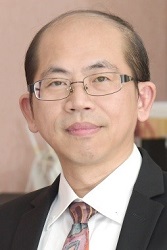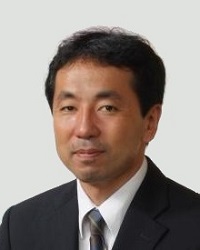Plenary Talks
Plenary Talk 1

Professor Robert Chen-Hao Chang
(National Chung Hsing University)
"Security and surveillance technologies for the smart community"
Abstract: In this talk, security and surveillance technologies for the smart community will be presented. For the household security monitoring and the community environmental monitoring, technologies for identity recognition and 360-degree view panorama monitoring are developed. For identity recognition, Palm vein recognition and Iris/Sclera vascular/Pupil eye movement pattern recognitions are investigated. The advanced technologies can be utilized to build a real-time monitoring system that can prevent suspicious persons from invading the community environment.
Biography: Robert Chen-Hao Chang received B.S. and M.S. degrees in electrical engineering from National Taiwan University, Taipei, Taiwan, in 1987 and 1989, respectively, and the Ph.D. degree in electrical engineering from the University of Southern California (USC), Los Angeles, in 1995.
In 1996, he joined the faculty of the Department of Electrical Engineering, National Chung Hsing University (NCHU), Taichung, Taiwan, where he is currently a Distinguished Professor. He served as the Director of the Center for Research and Development of Engineering Technology of the College of Engineering from 2005 to 2006, the Chairman of the Electrical Engineering Department from 2006 to 2008, the Deputy Director General of the National Chip Implementation Center in Hsinchu, Taiwan from 2011/3 to 2014/1, and the Dean of College of Science of Technology, National Chi Nan University, Nantou, Taiwan from 2014 to 2017. He has published more than 100 technical journal and conference papers. His research interests include SoC & signal processing systems and mixed-signal IC design.
Dr. Chang was a recipient of the Distinguished Teaching Award from NCHU in 2004. He is a Fellow of IET and a member of Tau Beta Pi. He was a Distinguished Lecturer of the IEEE Circuits and Systems Society in 2013 and 2014. He served as an Associate Editor for IEEE Trans. on Very Large Scale Integration (VLSI) Systems from 2010 to 2014, IEEE CASS Taipei Chapter Chair from 2011 to 2012, IEEE CASS NG TC Chair from 2015 to 2017, and IEEE A-SSCC TPC DCS Sub-Committee Chair from 2015, and IEEE Systems Council CASS Primary Representative from 2016.
Plenary Talk 2

Professor Atsushi Takahashi
(Tokyo Institute of Technology)
"Routing Algorithms - from classic to advanced -"
Abstract: Routing has been extensively studied as one of key issues in physical design area of the electric design automation from its emergence, and various routing algorithms, tools and systems have been developed and used in practice. However, research and development of routing is still required since new constraints and objectives forced on routing arise continuously from new technologies. In this talk, various routing algorithms such as shortest path, spanning tree, Steinear tree, clock tree, routings for packages, for printed circuit boards, for advanced lithography as well as various ideas which are used in these algorithms will be introduced.
Biography: Atsushi Takahashi received his B.E., M.E., and D.E. degrees in electrical and electronic engineering from Tokyo Institute of Technology, Tokyo, Japan, in 1989, 1991, and 1996, respectively. He had been with the Tokyo Institute of Technology as a research associate from 1991 to 1997, and as an associate professor from 1997 to 2009 and from 2012 to 2015, and as a professor from 2015. He had been with the Osaka University as an associate professor from 2009 to 2012. He is currently with Department of Information and Communications Engineering, School of Engineering, Tokyo Institute of Technology. His research interests include electric design automation and combinational algorithms. He is currently a member of IEEE CASS Board of Governors (BoG), Fundamentals Review Editor-in-Chief of IEICE ESS, Technical Program Chair of ASP-DAC 2018, and others. He is a member of ACM, and a senior member of IEEE, IEICE, and IPSJ.
